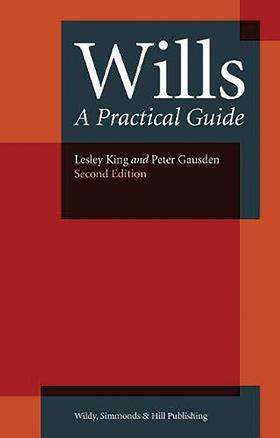Caroline Woodham reviews the second edition of a practical guide to preparing a will and avoiding the issues that can lead to litigation

This second edition of Wills: A Practical Guide presents the reader with an up-to-date, accessible commentary on the legal and practical issues relating to the preparation of wills. It addresses the circumstances which may give rise to litigation and explains the steps that can be taken to mitigate such risks.
Leading wills, trusts and probate author and lecturer Professor Lesley King will probably be well known to many Private Client Section members, while consultant solicitor Peter Gausden was previously a principal lecturer at the College of Law (now the University of Law) and contributes to significant legal works.
The book tackles all the key legal topics you would expect from a will preparatory guide, including testamentary capacity, the requirements of a valid will, appointment of executors, dispositive provisions and inheritance tax considerations. It takes this further by also discussing in detail some of the less common issues involved when preparing wills, for example, foreign property matters, options for dealing with the testator’s home and land, and the question of who is responsible for the body of a deceased person.
The authors do not shy away from dealing comprehensively with matters which cross into other legal fields, in particular property matters and elements of family law. The chapter on the appointment of testamentary guardians provides an especially clear analysis of the requirements for a valid appointment of a guardian, and how these interact with the requirements for a valid will.
Wills: A Practical Guide explores the core legal rules of the topics examined, starting with the basics and building on them. It addresses key statute and case law in a manner that sits well with the prose, making for a pleasant reading experience. By its very title, the guide sets out to be “practical”, and manages to achieve it. Through the use of realistic scenarios throughout the book, the authors clearly explain how the law operates. There are also checklists of points for practitioners to consider, or questions to ask, as well as protective advice for the person responsible for preparing the will, particularly where the testator’s circumstances or choices may lead to litigation in future.
The book has chapters dedicated solely to the practical considerations of preparing a will, including storage; avoiding pitfalls when drafting; and the matters to keep in mind when taking instructions and executing the will. The authors give clear and direct answers about what to do in situations where there is no perfect solution, to best protect both the testator and the will drafter.
Litigation considerations are well integrated into the book. Within the context of the legal issues they are addressing, the authors bring to light the circumstances where litigation is more likely to arise, and provide advice on how a person preparing a will can navigate these issues. The authors’ easy shift between the legal, practical and litigation elements make for a logical read, allowing the reader to understand the links between the issues, how they manifest in practice, and the matters which should be considered to mitigate the risks. For those of us who specialise in will preparation and related issues, it is accepted that there could be a risk of litigation stemming from a testator’s wishes, their circumstances or the situation in which their will needs to be prepared. Clear guidance on how best to manoeuvre through some of these issues in an increasingly contentious environment is both invaluable and reassuring. For me, the book really delivers here.
Overall, Wills: A Practical Guide delivers a comprehensive explanation of what is involved in making a will, and readily references those issues which give rise to litigation and how to avoid them. Technical terminology is used, but is well explained, creating an accessible and smooth read. The book has an emphasis on the practical aspects of preparing a will, with detailed commentary on the law, illustrative examples, and hints and tips from the authors. It also pays attention to the potential pitfalls involved in will preparation, with guidance on avoiding them and the associated costs.
For those with limited experience in the practice of will preparation, this book provides a solid foundation of the legal requirements, practical application of the law, and the potential problems which may arise. While the book is directed at those looking to build a basic knowledge of will preparation, experienced practitioners may also find some useful tips for dealing with and resolving the more unusual situations that can come up. I will be recommending Wills: A Practical Guide to colleagues.

Wills: A Practical Guide
Professor Lesley King and Peter Gausden
Wildy, Simmonds and Hill Publishing, 2nd edition, 2019
£39
ISBN: 9780854902743




